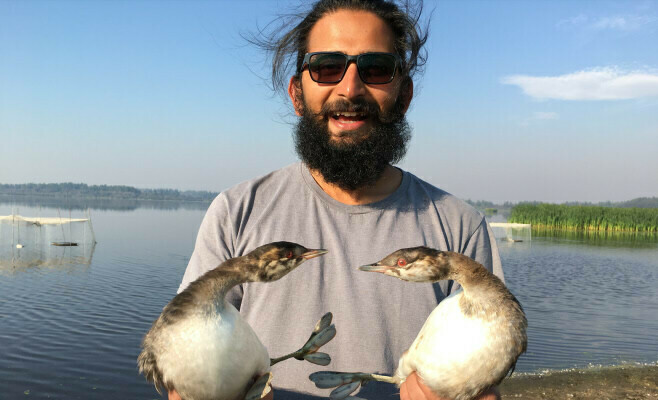Environmental Studies (ENVS) at King's
Helping to sustain the Earth requires an understanding of the scientific and social aspects of environmental issues. By standing in awe of God's creation, and confronting pressing issues head on, we can cultivate a world that flourishes with life and abundance for all.
Inside This Program
Understand, Protect, Restore
Explore our incredible natural world and find solutions to challenges like climate change, food security, or habitat degradation. Examine how humans impact life on this planet and ways we might build lifestyles and societies that allow us to live in harmony with creation.
Participate In Hands-On Experiences
As an ENVS student, you can look forward to interactive classrooms and laboratory activities, annual field trips throughout Western Canada, and a summer internship.
Specialize In Areas You Find Most Interesting
Environmental studies at King's tackles issues from multiple perspectives at the same time. Pursue a Bachelor of Arts in Environmental Studies to focus on human aspects of environmental stewardship such as government policy, social change, and sustainable practices. Choose a Bachelor of Science in Environmental Studies if you want to dive into conservation biology, reclamation work, or other pursuits from a scientific perspective.
Off-Campus Studies
Field Trips
The best way to learn about the environment is to spend time exploring it! In addition to day trips to locations and initiatives around Edmonton, several courses feature overnight trips to national parks, natural resource sites, and unique geographical features.
Regular field trips include:
- Edmonton: River valley and ravine system (hikes, rafting, etc.); Wastewater Treatment Plant; Waste Management Centre; net-zero church and social housing project; urban social justice walk
- Fort McMurray: Oil sands and pulp mill
- Banff & Canmore: Town planners, park wardens, local environmental agencies
- Jasper: Physical geography of mountains and glaciers
- Drumheller: Physical geography of the Alberta badlands
- Crowsnest Pass/Cypress Hills: Ecology of plants, mammals, and birds
Au Sable Institute of Environmental Studies
King's partnership with the Au Sable Institute of Environmental Studies opens 22 additional field-based environmental studies courses to students. With campuses located in Tiruchirappalli, India; Great Lakes in northern Michigan; Vera Blanca, Costa Rica; Pacific Rim Institute, Whidbey Island; and Chicago, Illinois, Au Sable offers topics ranging from marine biology to tropical agriculture to alpine ecology.
Au Sable is dedicated to inspiring and educating people to serve, protect and restore God's earth.
Internships
All environmental studies students participate in a 13-week summer internship after completing their third year. ENVS alumni have held internships in municipal, provincial, and federal government, small and large-scale industry, and non-governmental organizations. Interns gain valuable experience by putting the skills and knowledge they are learning in their program into practice.
- Student Wildlife Technician, Canadian Wildlife Services, Environment Canada
- Conservation Educator, City of Okotoks
- Laboratory Technologist, Imperial Oil
- Summer Technician, Parsons Consulting,
- Conservation Site Officer, Alberta Conservation Association
- Education and Outreach, North Saskatchewan Watershed Alliance
- International Environmental Research Assistant: Conservation Agriculture, Kenya
- Seasonal Parks Ranger, BC Parks

"My ENVS professors encouraged me to pursue my interests and support me in finding exciting, meaningful internship placements."